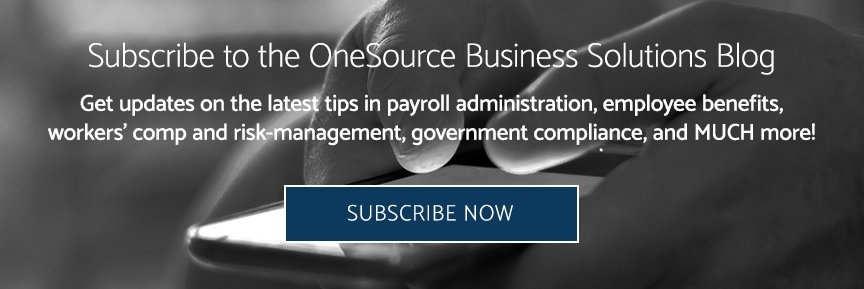OneSource Business Solutions Blog
HR Compliance Issues: 5 Laws You Need to Know

Remaining compliant with human resources issues ensures your organization maintains fairness in human resources practices. This ultimately affects the quality of new talent you attract, their development at your company, and your employee retention rate. Failure to adhere to HR compliance laws can be expensive when you have to pay a fine or damages in a civil lawsuit.
Your organization has implemented policies and practices complying with local, state, and federal regulations about fair practices and workplace procedures. HR compliance issues refer to questions or failures that arise with these policies. You need to have a broad understanding of the primary HR compliance laws, so you can remain in compliance while meeting your company's human capital objectives.
Five HR Compliance Laws to Know
Below is a broad overview of five major HR compliance laws, including examples of violations and potential consequences for your business.
Family and Medical Leave Act (FMLA)
The FMLA permits your employees to take an unpaid 12-week leave of absence for specific family and medical reasons. The law provides a 26-week break for circumstances related to military service. During this time, you must continue their group health insurance coverage and protect their job for their eventual return. Benefits coverage must be the same as if the employee never took leave.
Non-compliance with FMLA can take many forms. For example, businesses that do not allow maternity leave or refuse to let an employee return to their job violate FMLA. These violations open businesses up to costly civil lawsuits that sometimes require companies to pay damages to employees. Additionally, the Department of Labor fines can easily be thousands or tens of thousands of dollars, depending on the situation.
Fair Labor Standards Act (FLSA)
The FLSA is the federal law that sets the minimum wage and regulations concerning overtime, child labor, and recordkeeping. Employers can easily make recordkeeping mistakes that put them in violation of the FLSA.
For example, the failure to monitor assigned hours to minor employees or provide required pay for overtime can result in fines. Similarly, not paying employees the mandatory federal minimum wage is also in violation of the FLSA. If the Department of Labor audits a business, or an employee files a complaint, and they find someone intentionally violated FLSA regulations, they will assess a fine against the company. Individuals who violate the FLSA face criminal prosecution and a fine of up to $10,000.
Americans with Disabilities Act (ADA)
The ADA is the collection of federal laws that protects people with disabilities from discrimination in many areas of their life. Employers cannot discriminate against job candidates and employees if they have a disability. This includes making reasonable accommodations that do not cause undue hardship for an employer. Some examples include providing large print documents, accessible entrances, accessible restroom facilities, and special equipment to perform job-related tasks.
If a company denies a job candidate a position or refuses an employee’s advancement because of a disability, they violate the ADA. The result of non-compliance with ADA rules and regulations can lead to hefty fines between $50,000 and $75,000.
Anti-Discrimination Laws
Employers in the United States are prohibited from discriminating against employees based on race, color, religion, national origin, or sex under Title VII of the Civil Rights Act of 1964. If a company makes any employment decision based on these factors, including recruitment, termination, promotions, and pay increases, they are in non-compliance. The Equal Employment Opportunity Commission (EEOC) is the governing authority that accepts and investigates complaints. Businesses can be fined for non-compliance and also open themselves up to civil liability.
Occupational Safety and Health (OSH) Act
Under OSH Act regulations, employers have a legal duty to create safe working conditions for employees. The Occupational Safety and Health Administration (OSHA) sets specific standards and rules that address things such as falls in the workplace or toxic exposure to chemicals.
Organizations who do not train their employees about safety practices at work, enforce best practices, or continually have safety-related injuries or fatalities in the workplace are not in compliance. OSHA audits worksites and fines companies that do not comply with regulations. Fines are well over $10,000 for first offenses. When an organization repeatedly violates OSHA regulations, they could be fined up to $134,000 for each violation uncovered during an audit.
Remain in Compliance Through HR Outsourcing
Professional Employer Organizations (PEOs) provide HR solutions for businesses of all sizes. Solutions are often client-specific and tailored to the needs of a particular company. They typically include HR administration, provision of employee benefits, payroll administration, and compliance.
Best practices for business operations and administration have many moving parts. Complying with local, state, and federal laws is one of those parts. Failures in compliance hurt business, but outsourcing HR functions help reduce and eliminate HR compliance issues. PEOs have the knowledge and resources to stay abreast of rapidly changing laws and regulations. That means saving businesses thousands of dollars in potential fines, millions in civil lawsuits, and possible criminal prosecution in the most extreme cases.
Recent Posts
Posts by Topic
- HR Outsourcing (37)
- Employee Benefits (14)
- Payroll & HR Administration (5)
- Strategic Planning & Research (5)
- Company Culture (4)
- HR Compliance (4)
- Industry – Professional Services (4)
- PEO (4)
- Workers’ Comp (4)
- Employee Turnover (3)
- OneSource PEO Company News (3)
- performance management (2)
- Navigating COVID-19 (1)
- manufacturing industry (1)
